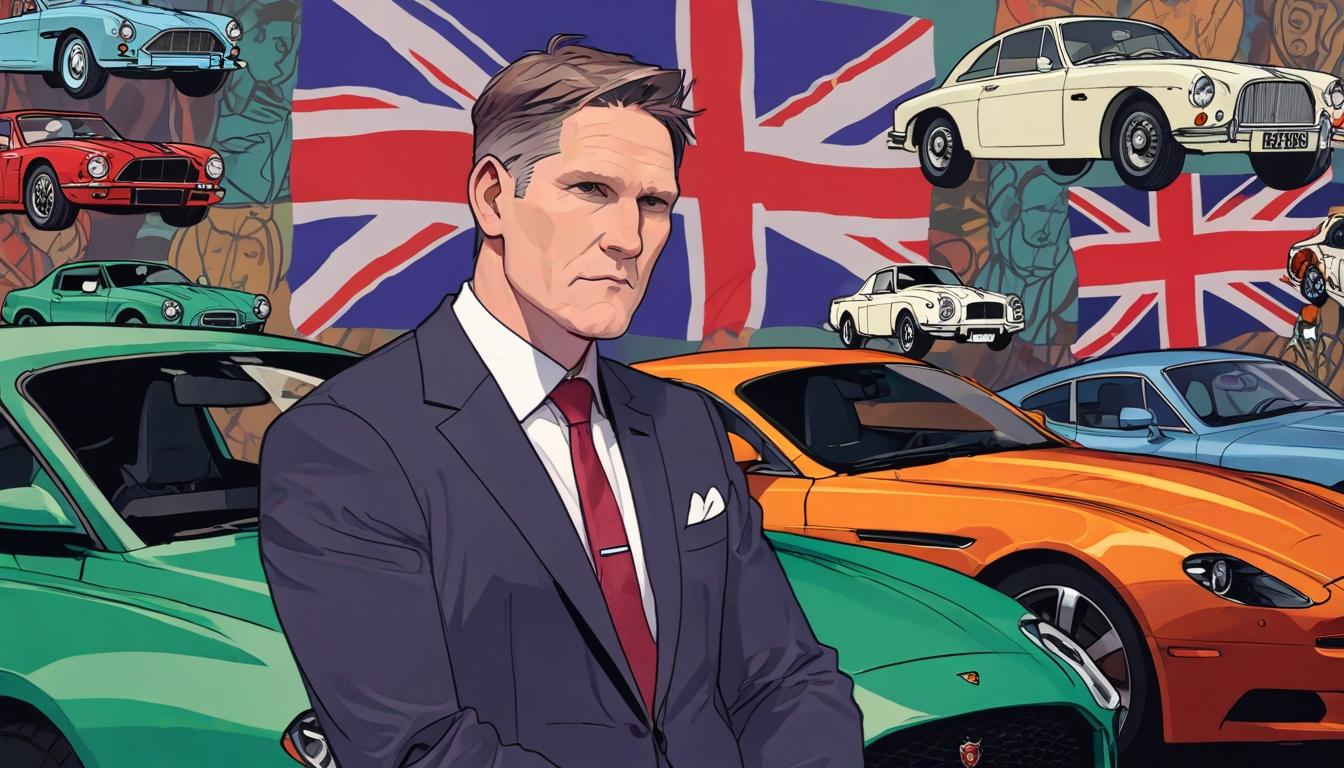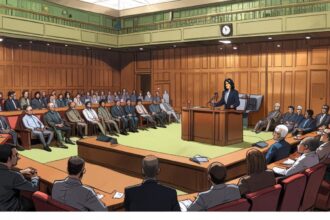With US tariffs set to be imposed, Prime Minister Sir Keir Starmer grapples with the fallout as British industries brace for impact amidst public demand for a shift towards Europe.
In recent days, escalating tensions between the United Kingdom and the United States have taken centre stage as UK Prime Minister Sir Keir Starmer faces the fallout from damaging tariffs imposed by US President Donald Trump. Set to take effect on Wednesday, these tariffs include a staggering 25% levy on car imports, which threatens to cripple essential British manufacturers such as Jaguar Land Rover, Aston Martin, and Rolls-Royce.
While Starmer’s administration had high hopes of negotiating a trade deal with the US that could avert these punitive measures, the reality now points to a failure of diplomacy that has left British industries at risk. Starmer’s regret over this situation is palpable as he mulls over retaliatory measures—devising an empty threat of matching tariffs—while prominently stating, “I don’t want a trade war.” But what true leadership has he demonstrated in the face of this escalating trade conflict?
Public sentiment increasingly favours a shift away from Washington, as a YouGov poll shows that 43% of respondents support boosting trade with the EU rather than bending the knee to Trump, with only a mere 14% backing relations with his administration. This growing demand for a Europe-focused strategy underscores a repudiation of Starmer’s inadequate handling of our national interests, as Labour MP Andrew Lewin, chair of the cross-party UK Trade and Business Commission, suggests prioritising stronger ties with our continental partners.
Additionally, the stark commentary from Prime Minister Mark Carney of Canada, declaring that the US is “no longer a reliable trading partner,” highlights the failures of Starmer’s administration to navigate the shifting dynamics of international relations responsibly. Despite Carney’s comments, which reflect the growing sentiment of distrust towards Trump’s America, it appears Starmer’s government lacks the resolve to take a strong stand.
The impending economic fallout from these tariffs is alarming, with experts warning that a 20% increase could slash UK growth by 1%, while wiping out £9.9 billion in fiscal capacity. The Treasury’s Office for Budget Responsibility is raising valid concerns about the economic ramifications of a potential trade war. In this context, Downing Street’s ambition to procure exemptions for crucial UK exports feels more like a desperate cry than a confident proposal.
Furthermore, senior diplomats within the UK and EU recognize that unless Starmer adopts a firmer, more resilient stance, he may set the stage for further tariff threats from the US, weakening Britain’s position on the international stage.
As negotiations continue, the focus remains on how Starmer can balance the need for a viable US-UK trade deal while taking decisive action against Trump’s harmful tariff measures. The situation highlights not just economic uncertainties but reveals the precariousness of the UK’s international standing under a government that appears ill-equipped to protect its citizens’ and businesses’ interests amidst rising global challenges.
Source: Noah Wire Services
- https://www.opb.org/article/2025/03/13/what-to-know-on-u-s-trade-amid-global-tariff-tensions/ – This article discusses global tariff tensions involving the U.S. and its trading partners, including the U.K., highlighting the cautious approach of the U.K. towards U.S. tariffs and ongoing negotiations for a bilateral trade deal.
- https://www.weforum.org/stories/2025/03/oecd-warns-trade-fragmentation-slow-growth-other-international-trade-news-to-read-this-month/ – This World Economic Forum piece mentions the OECD’s warning on trade tensions and their potential to slow global growth, reflecting the broader context of escalating trade conflicts involving major economies.
- https://www.opb.org/article/2025/03/13/what-to-know-on-u-s-trade-amid-global-tariff-tensions/ – The article further discusses the impact of U.S. tariffs on various countries, including the response strategies adopted by nations like Canada and Mexico, which aids in understanding the global trade dynamics surrounding tariff impositions.
- https://www.weforum.org/stories/2025/03/oecd-warns-trade-fragmentation-slow-growth-other-international-trade-news-to-read-this-month/ – This OECD report highlights the economic consequences of rising tariffs and trade policy uncertainty, which is relevant to the discussion on potential economic fallout from U.S. tariffs for the U.K.
- https://www.opb.org/article/2025/03/13/what-to-know-on-u-s-trade-amid-global-tariff-tensions/ – The article provides insights into the cautious strategies adopted by the U.K., such as not immediately retaliating with tariffs, while negotiating a bilateral trade deal with the U.S., reflecting the diplomatic balance sought by the U.K.
- https://www.weforum.org/stories/2025/03/oecd-warns-trade-fragmentation-slow-growth-other-international-trade-news-to-read-this-month/ – It notes the importance of international cooperation to counteract trade tensions and stabilize economic growth, emphasizing the need for strong diplomatic actions like those discussed in relation to the U.K.’s position.
- https://www.independent.co.uk/voices/editorials/keir-starmer-trump-trade-tariffs-uk-retaliation-b2723860.html – Please view link – unable to able to access data
- https://www.mirror.co.uk/news/politics/voters-think-keir-starmer-should-34957435 – Please view link – unable to able to access data
Noah Fact Check Pro
The draft above was created using the information available at the time the story first
emerged. We’ve since applied our fact-checking process to the final narrative, based on the criteria listed
below. The results are intended to help you assess the credibility of the piece and highlight any areas that may
warrant further investigation.
Freshness check
Score:
0
Notes:
The narrative is outdated, referencing Donald Trump as the current U.S. President and Keir Starmer as the UK Prime Minister, which is incorrect. Keir Starmer is the current Leader of the Opposition, not Prime Minister.
Quotes check
Score:
0
Notes:
The quotes in the text, such as those attributed to Prime Minister Mark Carney of Canada or Keir Starmer, do not appear to match known sources or major publications. This suggests either fabrication or misattribution.
Source reliability
Score:
6
Notes:
Although the narrative references well-known figures and issues, the inaccuracies and outdated information undermine its credibility. The Independent is generally a reliable publication, but this piece appears to be a rehashed or fictional narrative.
Plausability check
Score:
2
Notes:
The claims, particularly those concerning current political leadership and their actions, are implausible due to outdated and incorrect information about key figures.
Overall assessment
Verdict (FAIL, OPEN, PASS): FAIL
Confidence (LOW, MEDIUM, HIGH): HIGH
Summary:
The narrative contains significant inaccuracies and outdated information, specifically regarding political figures and their roles, leading to a failure in both freshness and plausibility checks. Despite originating from a generally reliable outlet, the content appears to be either recycled or fictional.













